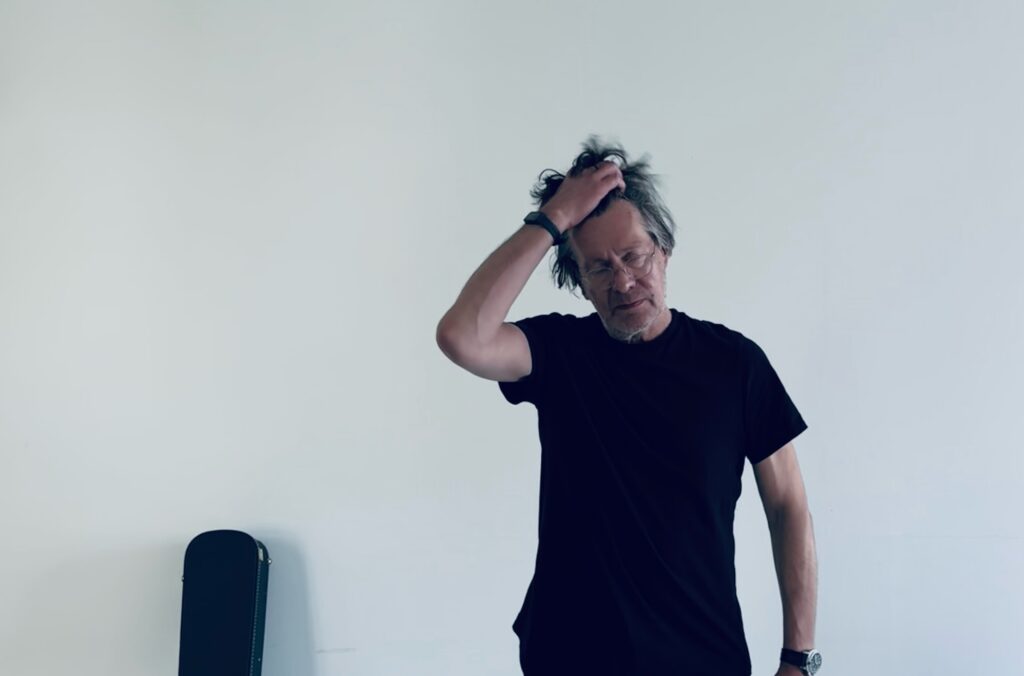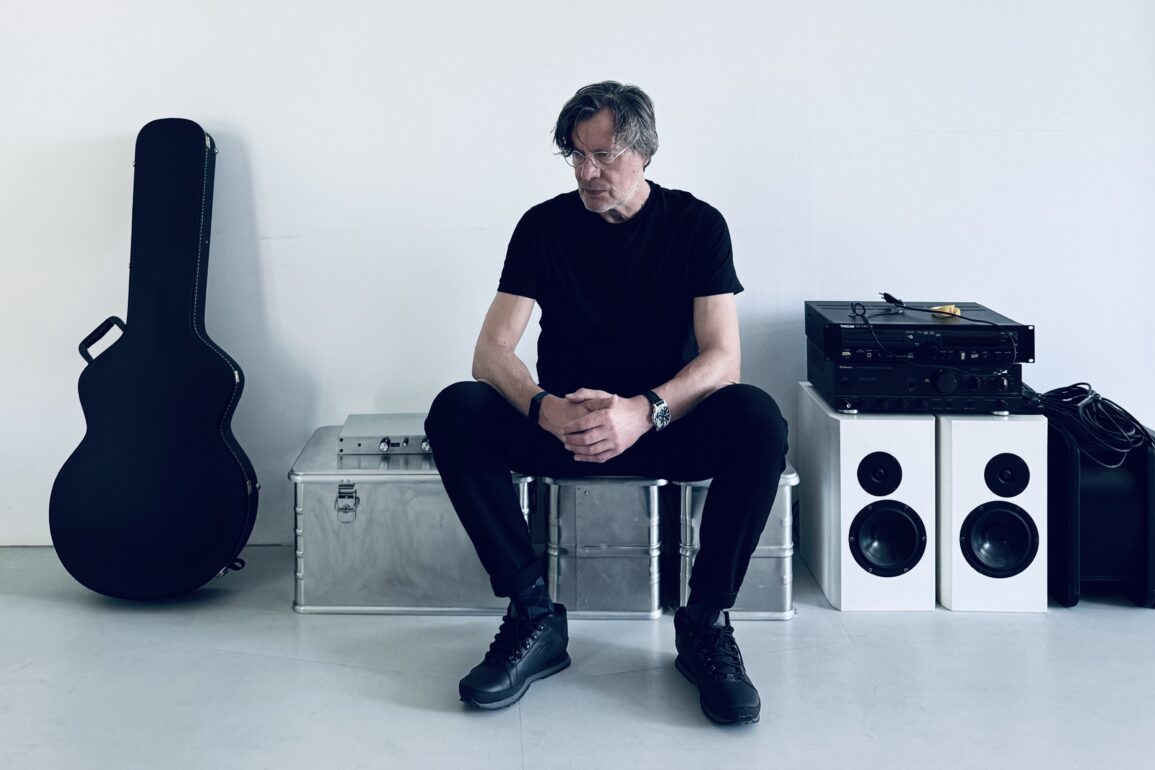Photo Credit: Carsten Nicolai
Austrian experimental electronic auteur Christian Fennesz released his latest album, Mosaic, at the end of 2024. We had a chat together through Zoom to find out more about it.
On a personal level, how would you rate 2024?
Christian Fennesz: In society, with war everywhere, it was not very uplifting, I’d say. We’ve had better years than 2024.
Yeah, I think this decade is already feeling more dystopic than the last one.
Yes, absolutely. It was okay on a personal level, because I keep on building my own cocoon around me, my own world. But even looking at the news every day is horrifying, you know?
Thankfully, we have good music as always, and one of those is obviously Mosaic. The title interests me, as mosaic is an old art form of collecting images to form a bigger image, and I always thought of music as some sort of collage work combining different sound elements. So maybe we can first talk about how you came up with that title.
It was some kind of brainstorming that I had with my wife and also with the people from Touch. It was about the work itself for this album. It was really like putting one element to another, and this reminded me of the very ancient artwork of mosaics. So that was one thing. Also we’d seen this amazing TV show on Apple TV called Dark Matter. It was about a person sleeping from one dimension into the other, he was the same person but in a different dimension, he was different. So he went through like fifty stages of that. I thought that premise was really interesting because this makes the mosaic of one individual psychologically. All these things came to my mind, and in the end, I thought was a good title for what I was thinking at the moment.
I have heard of the show and I intend to watch it at some point. I also believe that pieces that make a large piece may seem irrelevant at first, but they gain relevance and context in our hands, which is basically the beauty of creation.
Yeah, that’s true. It was like that, but it was also a step-by-step kind of work, you know? I didn’t have a concept in mind. I started in front of an empty white canvas. I had to put one element and connect it to another. That was very much like building a mosaic. There’s not much philosophy behind it. It’s a simple idea, but it works.
I’ll squeeze in a little philosophy, though: One of my favorite quotes on art goes, “Art is never finished, only abandoned.” To me, that implies an art piece finding new meaning among its audience after being abandoned by its creator. Would you agree?
Yes, absolutely. I agree with you. That’s true.
What is the place that we see on the album cover?
It’s by Jon Wozencroft, he’s doing the artwork for the Touch albums. In the photo, you see the island of Corfu in Greece. He had spent his holiday there, so he took it there.
I used to live in Istanbul, and I thought it was maybe somewhere near depicted on the cover.
Yeah. It looks like the Bosphorus somehow. When I first saw it, I was sure it was Istanbul, but he said, “No, that was taken in Corfu.”
Can you name three specific memories attached to Mosaic’s making process?
Well, it starts with the first track I had. I had worked on “Heliconia”s first part and I wanted to add a second part within the track, but I wanted it to sound completely different. To find the transition from Part A to Part B. Quite proud of it. That is the point where it actually clicked with me.
The next track, “Love and The Framed Insects” came really naturally just by playing a little bit guitar, and I had the composition ready within maybe 20 minutes. And then of course, the production work with the mixing and everything was taking much longer. What I’m trying to say is, when I had this first track finished, everything else came quite easily and naturally.
Was that track a setting stone?
Yeah. The last thing that might be another highlight for me within the production was “Goniorizon”. It really sounds like something completely new to me, something I haven’t done before. The technical aspects of the track, the producing, the mixing, the effects that I was using, it’s very different from what I’ve done before. So I’m happy that track is at the end of the album, because it maybe opens the door for the next project.
Do you have any ideas about what that next project might sound like?
What I have are certain techniques that I want to explore further. There’s something very interesting there. Lately, through the work of Mosaic, I came back to what I had started with when I first made electronic music, which is sampling. So now, I kind of do the sampling thing. It’s quite old school, but I love it when you just have a certain amount of sampling time, where you have to make loops and all that. This is how I worked when I started and I’m kind of going back to this.
So my first idea for the next project would be to focus on that sampling procedure a little bit more than I have done in the last years. I mean, I love synthesizers. I love the guitar and all that, but I always come back to the sampler in the end. With Mosaic, I realised that this is maybe an instrument that’s very close to me, like the guitar. I never really got into this modular synthesizer thing, even if I love it. I love the sound, but it’s a very complex thing. So I think I’d rather stay within a field that where I know how it works. And that’s the guitar, the effects, some MAX/MSP patches that I’m using and the sampler. So I’m going to buy a little sampling machine again. Not only to plug it, but I want to have it in front of my eyes and work on that machine like an instrument. But that’s the next one. Who knows, maybe I’m doing something completely different, you know?
I also love sampling. I have had a Roland P6 for some time now.
Yeah! I’ve been looking at that one too. There’s another one which was sold out and now it’s available in January again, from a Danish company called Torso Electronics. It looks very much like an early sampler I was using, which was Ensoniq ARS-10. It’s the same kind of architecture. I would love to go back to that, because I miss my old Ensoniq sampler.
The thing I like about sampling, as well as field recordings, is that we can just capture a moment in sound and then fiddle with it, which feels magical to me.
Yeah, and I kind of miss that. As I said, synthesizers are great. Lovely, and great to add on something. But sampling and acoustic instruments with electronics only on top is the thing for me. That’s my very personal kind of approach.
Can you also explain further what kind of software and physical tools went into making Mosaic?
It’s very much related to state-of-the-art technology. 10 or 15 years ago, these possibilities we have now weren’t there. So I’m always trying to use what’s new and what’s fresh and what’s exciting, and I put all that into my own production style. So I’m always keeping my eyes open. In the case of Mosaic, I was buying loads of plugins, and really checking them out completely. So I think what you hear in Mosaic is more state-of-the-art technology than ever. I’ve also done albums where I was using the studio in a quite traditional way, recording guitars, arranging microphone positions, using old vintage preamps and compressors… But this year I really focused on what digital technology can do in music today.
Do you think you changing your studio space three times in the past five years also relates to you always seeking something fresh?
Yeah, well, the last five years went busy for me. I’m only here in this new place together with my wife for almost two years now. Now we have reached a final home, but before it always had to change. And it makes a difference. Every room sounds different. I’m using a small room here, but I bought these really nice Neumann speakers, and for the first time in a while, I have the impression that the room sounds great and I can hear everything in the production. I’ve had that before when I had a big commercial studio, which I had to give up. I had a very good monitor system there as well, and I could hear everything. I think you can hear that on albums like Black Sea, but then for a while, I had really sh.tty home studios, and the speakers were just too big for a small room and all that. Here, now there is balance again. I’m very happy with this room, I think it sounds special. The production sounds different in every studio. I think the room plays a big role.

What do you think are some pros and cons of studying music?
It’s such a long time ago when I did that, and music was not my my first thing, it was musicology. More like history of music and non European music. But I was also studying social anthropology. That was my main degree, and in general, I was not a very good student. I was always making music, and I I’m more or less self-taught, but of course I have learned a bit through musicology, and also studying music history. But in the end it was just me. I was teaching myself, I guess.
Well, when I was very young, I had classes in classical guitar. That was quite helpful. But then soon after I started with electric guitars and played rock music.
You were indeed in a punk rock band when you were 14 years old. Do you think any footage or other relic remains from that band?
That was all pre-internet, such a long time ago. Now there’s nothing. Actually, my mom probably has some pictures. I’m always looking onward, you know. For me, that was something I happily forgot. (laughs)
Do you dream often? What do you usually dream about? How is your dream life in general?
Well, quite mad sometimes. I dream nicely, I must say. I think 70% or 80% are quite nice dreams, sometimes even about music and sound. And sometimes it’s a classic psycho dream like everybody else has. (laughs) But I can dream. I dream very clear stories, actually. Sometimes I remember when I wake up, and it all makes sense somehow. And it’s funny what combinations you make just because of recent experiences and how you transform them into something really funny, or almost stupid. That is always fascinating.
Do you think those dreams that you remember after waking up ever inspire your music to a degree?
Yes, could be. Certainly. Every once in a while I dream of a track, like a melody or something. And 80% of that I forget, but there are 20% when I wake up and I can actually recall, it might be a chord progression or a melody or something. That’s the way it happens. For instance, a very early album of mine, Endless Summer, had a title track. Half of that song I saw in a dream. I could recall it a little bit, and I worked on top of that. But originally, it was coming from a dream.
That’s always interesting because, as you might know, there a few examples of melodies inspired by dreams, like The Beatles’ “Yesterday”.
Yeah, absolutely.
If only we could remember it all.
If only I could. Yeah. Maybe at some point, we will invent some kind of device that records everything you know in your dream. That would be fantastic. Who knows? Maybe in like 20 years we can have that, you know?
What I have are certain techniques that I want to explore further. There’s something very interesting there. Lately, through the work of Mosaic, I came back to what I had started with when I first made electronic music, which is sampling. So now, I kind of do the sampling thing.
I want to ask you about films. Obviously you aren’t a stranger to that field, you have made film scores in the past, but I want to know what films you watched and loved in 2024?
Well, just recently, I’ve seen a film that has actually shocked me, and I think it’s it’s extremely well made: Civil War. It was shocking because it was so, so realistic. The events in that film could happen anytime in America. I think it’s not science fiction. It actually could happen next month, which is very, very scary. It was a strong film, and I was thinking about it for days afterward. It made a big impact on me. The other thing I told already is Dark Matter, which is a fascinating TV show. Those are the two very impressive things that I’ve seen this year.
Do you remember the three most recent songs you listened to?
Yesterday I was chatting with Mike Harding and Jon Wozencroft from the Touch label, and John suddenly came up with this The Beatles quiz. Jon always knows background stories, he’s a lexicon full of information about music. So we did that, all three of us in a chat. And that made me listen back to some The Beatles tracks that I hadn’t known. For example, I’d never heard of the track “Rain” before. It’s the B-side of “Paperback Writer”, and it’s an amazing track. It doesn’t even sound like The Beatles!
I was also listening to the latest KMRU album. Finally, I was listening to the latest Jim O’Rourke album that was part of the Steamroom series on Bandcamp. He’s doing a new record every month, and they’re all great.
What do you think of the new The Beatles song, “Now and Then”, released last year? Some people criticized its production because it sounded old and modern at the same time.
We need to consider how poor that recording of John Lennon used in the song was, it was just a tape cassette recording. As a producer, I know how much work it is to make that sound good. So they actually did a very good job. It was a good mix of the classic The Beatles sound and today’s production. I know it has been criticized a lot, but I think it was absolutely OK.
That’s all of my questions. It was nice meeting you.
Nice meeting you too, man. Let’s stay in touch.
You can check out Fennesz’s official site here and Bandcamp profile here.



